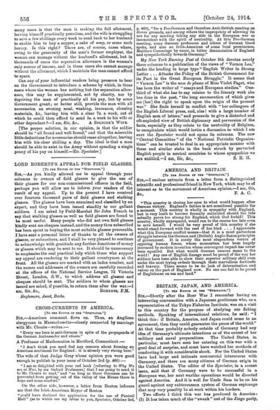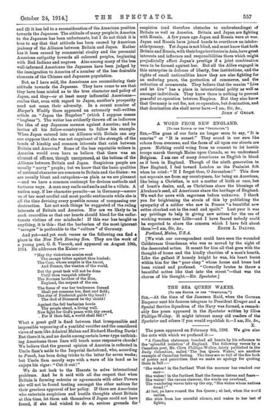BRITAIN, JAPAN, AND AMERICA.
[To SEE EDITOR OF MO "SPECTATOR."] SIR,—Shortly after the Boer War I remember having an interesting conversation with a Japanese gentleman who, as a representative of the Tokyo Fisheries Institute, was on a visit to this country for the purpose of studying our fishing methods. Speaking of international relations, he said : " I think this : if Britain, America, and Japan could come to an agreement, then they could guarantee the peace of the world." At that time probably nobody outside of Germany bad any idea of Germany's ultimate intentions or of the extent of her military and naval preparations. The United States, in particular, must have seen her entering on this war with a good deal of surprise, and must have watched her methods of conducting it with considerable shock. For the United States have had large and intimate commercial intercourse with Germany, and there are many citizens of German origin in the United States. The editor of the Spectator, in a recent issue, said that if Germany were to be successful in a European war, her next warlike operations would be directed against America. And it is well for Uncle Sam to be on his guard against any subterranean system of German espionage that may very possibly be at work within his borders.
Two effects I think this war has produced in America : (1) It has taken much of the " swank " out of the Jingo party, and (2) it has led to a reconsideration of the American position towards the Japanese. The attitude of many people in America
to the Japanese has been unfortunate, but I do not think it is true to say that that attitude has been caused by American jealousy of the Alliance between Britain and Japan. Rather has it been caused by commercial rivalry and the perennial American antipathy towards all coloured peoples, beginning with Red Indians and negroes. Also among many of the less well-informed Americans the Japanese have been judged by the immigration to America of a number of the less desirable elements of the Chinese and Japanese population.
But, as I have said, the Americans are reconsidering their attitude towards the Japanese. They have come to see that they have been misled as to the true character and policy of Japan, and they—or at least many influential Americans— realize that, even with regard to Japan, another's prosperity need not mean their adversity. In a recent number of Harper's Weekly there appeared an extremely well-written article on "Japan the Bugaboo" (which I suppose means "bugbear "). The writer has evidently thrown off as ludicrous
the idea of any Japanese menace against America ; and he invites all his fellow-countrymen to follow his example.
When Japan entered into an Alliance with Britain can any one suppose that she was not cognizant of the strength of the bonds of kinship and common interests that exist between Britain and America ? Some of the less reputable writers in America would even have us believe that there was an element of offence, though unexpressed, at the bottom of the Alliance between Britain and Japan. Suspicious people are usually " nervy" people ; but we know that the basic qualities of national character are common to Britain and the States : we are usually blunt and outspoken—as plain as we are pleasant —and we have a common contempt for devious methods and tortuous ways. A man may smile and smile and be a villain. A nation may, if her character permits—as in Germany—assure us of her most cordial and most pacific sentiments while she is all the time devising every possible means of compassing our destruction. Let not such things be suggested of the ruling interests of Britain and America. Nor are we likely to be such crocodiles as that our hearts should bleed for the unfor- tunate victims of our misdeeds ! If this war has taught ns anything, it is this : that the barbarism of the most ignorant " savages " is preferable to the " culture " of Germany.
And yet—and yet such verses as the following can find a place in the New York Evening Sun. They are the work of
a young poet, G. S. Viereck, and appeared on August 10th, 1914. He addresses the Kaiser :—
"May thy victorious armies rout
The savage tribes against thee hurled: The Czar, whose sceptre is the knout, And France, the wanton of the world.
But thy great task will not be done Until thou vanquish utterly The Norman brother of the Hun, England, the serpent of the sea.
The flame of war her tradesmen fanned Shall yet consume her, fleet and field; The star of Frederick guide thy hand !
The God of Bismarck be thy shield!
Against the fell barbarian horde Thy people stand, a living wall. Now fight for God's peace with thy sword,
For if thou fail, a world shall fall !"
What a great gulf is fixed between that irresponsible and impossible vapouring of a youthful versifier and the considered views of men like Admiral Mahan and Richard Harding Davis But there it is, and no doubt among certain lower-type unthink- ing Americans these lines will touch some responsive chords! We believe that the general opinion of America is reflected in Uncle Sam's aside to the Imperial dachshund, who, according
to Punch, has been doing tricks to the latter for seven weeks; but Uncle Sam merely says with a wave of his hand as he
enjoys his cigar: "Cut it out ! "
We do not look to the Hearsta to solve international problems. And be it said with all due respect that when Britain is forming ententes or agreements with other Powers
she will not be found touting amongst the other nations for their gracious approval of her policy. If there are Americans who entertain suspicious and hostile thoughts about Britain at this time, let them ask themselves if Japan could not have found, if she had wished to do so, serious grounds for suspicion (and therefore obstacles to understandings) of Britain as well as America. Britain and Japan are fighting with Russia. A few years ago Japan and Russia were at war. Japan and Russia have joined hands to overthrow an intoler- able tyranny. Yet Japan is not blind, and must know that both Britain and Russia, with their huge territories in Asia, have great interests and influence and responsibilities there which might prejudicially affect Japan's prestige if a joint combination were to be formed against her. But all the Allies engaged in this enterprise in defence of liberty, free institutions, and the rights of small nationalities know they are also fighting for an enduring peace, the protection of commerce, and the reduction of armaments. They believe that the maxim "Live and let live" has a place in international polity as well as amongst individuals. They know there is nothing to prevent peaceful co-operation between Empires. But they also know that Germany is out for, not co-operation, but domination, and that domination she shall never have.—I am, Sir, &c.,
JOHN 0' GROAT.



































 Previous page
Previous page